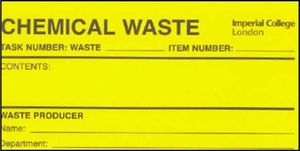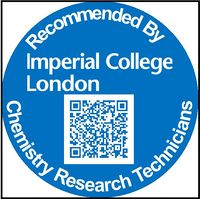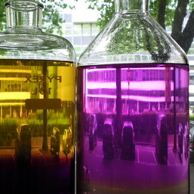CRTS:Chemistry Research Technical Support
This page is run by the Chemistry Research Technicians to provide you with useful information about departmental procedures, systems, equipment tutorials, recommended suppliers and finally - if we haven't already answered your query here - contact information.
Standard Procedures
This section details processes which are part of the day-to-day running of the department and affect everyone to a greater or lesser extent. Every-time you admire a notice/poster board, switch on your PC or hang your coat - technicians behind the scenes have enabled that to happen.
Equipment Repairs
A key purpose to having on-site technical support is performing quick repairs on the wide and varying range of equipment which is essential to your research operations. We understand that things get broken or damaged through everyday use - but before you come and see us, preferably before you use something - just have a look at our Equipment Tutorials section to make sure you are using your equipment properly. We are here to help - but you can help us by making sure our workload is no heavier than it need be. It should also be beneficial to you in savings on equipment down-time and repair/replacement costs.
Before you bring anything to us for repair, please make sure to complete a decontamination certificate available here. Please remember - we have to take apart some fairly complex pieces of equipment, servicing and repair is much easier to do when equipment is not contaminated. In the case of glass-blowing, the glass-blower will often have to blow into it directly which carries a fairly high risk of exposure.
If you kill your techncians they will not be able to help you any more. If you expose your technicians to unnecessary contamination risks they will be unhappy about it - do not be surprised if your repair jobs do not get done.
Repair Disciplines
The CRT currently have the expertise to operate three main areas of equipment repair - Mechanical, Electrical and Glass-ware.
Mechanical repairs centre around Vacuum pumps; there are also occasional hydraulic presses and pressured reaction vessels. The basic diagnostics can be conducted by most of the team who can also perform basic repairs. More serious problems require man-hours we do not have to fix and consequently these jobs may be sent off-site at greater cost.
Electrical repairs are conducted by Stefanos Karapanagiotidis who is also our departmental PAT Tester; as such, you can be confident of an extremely high quality of repairs.
Glass repairs can be carried out on-site by Stephen Ramsey. Where Steve cannot help you directly he can recommend an external company at prices agreed with the Department.
Electrical Safety Testing
Electrical Safety Testing - commonly referred to as PAT Testing (Portable Appliance Testing) - is an essential Health & Safety requirement which is carried out in the Chemistry Department by Stefanos Karapanagiotidis, our qualified PAT Tester.
PAT Testing, done properly, can be quite a lengthy process and given the multitude of electrical items in use in the Department it takes up a considerable amount of Stefanos' time. Please find more information about PAT Testing and the procedure on the dedicated page.
Cardice Deliveries
Due to the essential nature of Cardice, with respect to Chemical Research, the Department receives routine deliveries of Cardice. For full details on the procedure please visit our dedicated page here.
Waste Streams
There are a variety of Waste Streams in operation within the Department covering everything from domestic (landfill and recycling) all the way to hazardous clinical and chemical wastes. We must all be extremely vigilant to ensure no-one is unnecessarily exposed to any hazardous wastes once they have left your labs.
The main routes of disposal from the department are:
- Landfill
- Recycling
- Paper & Card
- Plastics

- Bulk
- Hydrocarbon
- Chlorinated
- Silica
- Clinical
- Lab Smalls
More information can be found on each of the dedicated pages, or from our Waste Management Portal here.
Defects (Cleaning/Infrastructure)
From time to time you may notice things are not exactly as they should be. This can be an inconvenience to you, but also to all the others who use the same facilities.
In order to get the quickest fix we need you to report it as soon as you find it. We do not expect you to go changing light-bulbs on behalf of the college, not least because there is an element of danger (often larger than you may realise) involved in doing so.
All defects of this nature should be reported to the FM Helpdesk. They operate a hotline, which can be reached by dialling 48000 from any college extension phone (those ones in every hallway) or you can log the job online here.
Laundry Facilities for Lab Coats
Part of the Department's responsibility to ensure everyone is appropriately attired in the lab also covers the state of the lab coats you wear. We would not expect you to take a soiled and/or contaminated lab coat outside of the department in public areas or on public transport so we offer an on-site service to remove this risk.
You wouldn't dream of wearing the same shirt or jumper unwashed for months or even years, so why do the same with your lab-coat? Repeated soiling will eventually penetrate your lab coat to the point where it is not performing the protective function it is designed to do. You should plan to wash it well before this time.
The CRT operate a washing facility, for lab-coats only, in the Technicians' Workshop - 132a, C1 (just inside Briscoe). Bring down 8-10 lab coats from your lab, we can supply detergent. If you want your lab coat back, be sure to label it with your name under the back of the collar. The washer/dryer delivers lab coats mostly dry after a 4-5 hour cycle.
We keep a pool of lab coats for those without.
Systems
Solvent Drying Towers
The Department operates Solvent Drying Towers as a safer alternative to solvent stills. With a moderate amount of expertise, they have been operated at lower cost and producing drier solvents than would be possible using the stills.
There are two solvent drying stations, comprising four rigs in total, one each located on Level 6, C1, Chemistry and Room 307, RCS1. More information about them can be found on their dedicated page here.
Chemical Tracking Program
The College is investing in a Chemical Tracking/Inventory Program which will be piloted in Chemistry. The project is currently entering the implementation stage so you can expect more details here soon.
Bill Mason is the Technician taking part in implementing the project in Chemistry, please do contact him should you have any questions.
Short-term Vacuum Pump Loans
The CRT maintain a small stock of pumps that have mostly been brought back to life after being abandoned by former owners. These pumps have either been rebuilt in house or by an external company LabVac or Oerlikon Leybold. These units are for sale mostly around £400 each to cover my costs.
Contact Pete Sulsh to find out if your circumstances meet these conditions.
In-House Design & Manufacture

The CRT designs and supplies a range of specialist equipment where the commercial market does not meet particular specialist needs.
Continuing Lines
These items are produced in batch by the CRT for use in the department as needed.
More information can be found on the dedicated pages.
One-off Production
The CRT comprise a number of specialist design-engineers in multiple fields. The three main areas covered are electrical circuits, scientific glass-ware and machined items, produced respectively by Stephen Atkins, Stephen Ramsey and Lee Tooley.
More examples of their work can be found on the dedicated pages.
Equipment Tutorials & General Laboratory Techniques
There's a vast variety of equipment in the department, some multi-purpose and some highly specialised. There will always be a time when you approach something you have never used before. In order to make safe, effective and proper use of the equipment at your disposal please click through to our dedicated page where you can learn more from some people who have seen it all.
Recommended Equipment Suppliers

University Level Research receives vast amounts of funding (some people may disagree here) but also suffers from relatively high turnover as well. Academics both new and old all need new equipment from time to time and to save you time and money in the long run, please purchase from one of our recommended suppliers. These are agreed with College Central Purchasing, so you are getting the benefit of all that combined purchasing power for a cost you won't beat anywhere else - AND our knowledge and expertise, so your new equipment will be suited to the specialised chemical environment in which it will be put to use.
Please click through to our dedicated page to see our recommendations and prices.
Contact Information
If we haven't already answered your question on these pages, then you can find our contact information on our profile pages, linked here.
